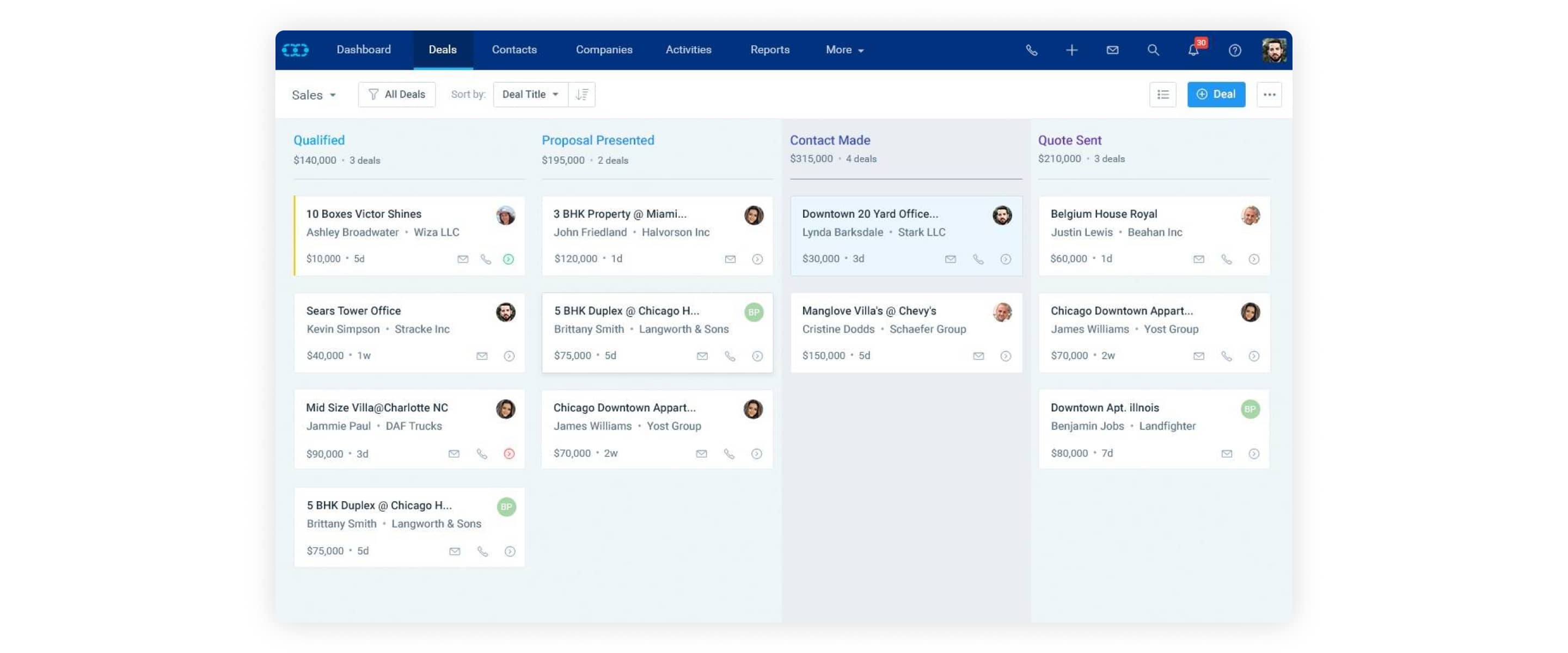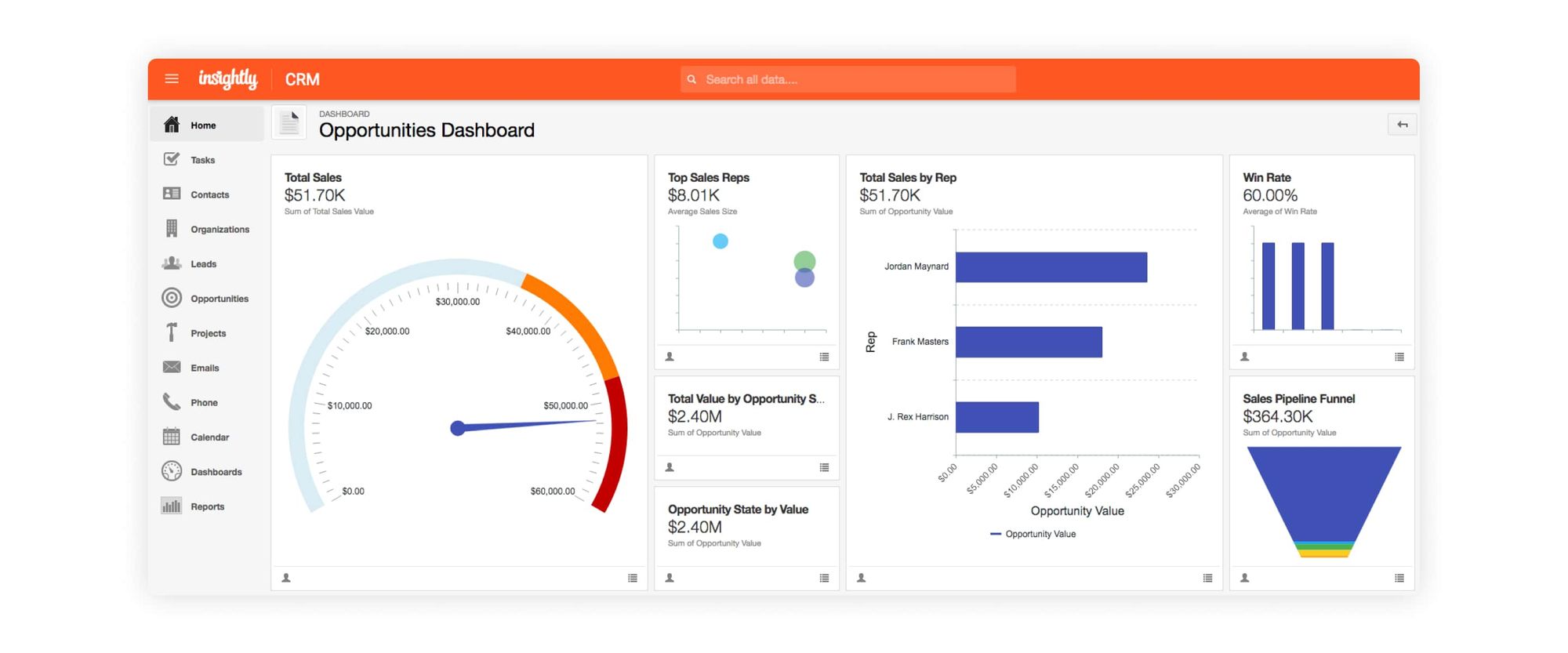Looking for the best CRM software for your business? Every growing business needs a Customer Relationship Management (CRM) solution to centralize all customer data and streamline business operations.
Here, we delve into five of the best CRM solutions on the market:
The Best CRM Software Solutions of 2020
Finding an ideal CRM solution for your business is no easy task. By considering the factors we mentioned above, you should find the best fit for your business. To help you get started, we’ve made a list of five exceptional CRM solutions for various kinds of organizations.
1. HubSpot: The Best Free CRM
One of the leading free CRM solutions you will find today is HubSpot. This cloud-based CRM can handle small and complex organizations. It gives you full visibility of your sales pipeline through a clean, navigable dashboard.

HubSpot notifies you the moment a prospect opens an email or goes to your website. Connecting to prospects and consumers is easy with live chats, free meeting scheduling, and click-to-call functionalities available for free.
✅ PROS:
- FREE
- No complex installations
- Unlimited users
⛔️ CONS:
- Basic reporting tools
- Limited depth of functionality
- Not very flexible
2. Zoho: The Best CRM for Small Business
Zoho is a web-based CRM solution that many businesses use to gain and retain consumers. It offers powerful, real-time analytics, allowing you to make well-informed business decisions. Other features that Zoho offers include website visitor tracking.

It comes with a free plan with basic features that allows up to three users. However, if you want to extend its functionality, you will have to subscribe to its paid packages.
✅ PROS:
- Free basic plan
- Simple, easy-to-use interface
- Powerful analytics
⛔️ CONS:
- Pricing tiers can be complicated
- Occasional bugs
- Customer support needs improvement
3. Salesmate: The Best Sales CRM
Salesmate CRM is an excellent choice for small businesses that want to improve sales processes. Instead of spreadsheets, it offers a highly visual and insightful perspective of your sales pipeline. It also integrates with more than 700 apps. With its drag-and-drop interface and easy-to-use features, your entire company can adopt it with zero training.

Ideal for small and medium-sized businesses, Salesforce lets you customize it to suit your sales processes. Even better, you can use the CRM on a laptop or mobile device.
✅ PROS:
- FREE 15-day trial
- Drag-and-drop interface
- Zero training required
⛔️ CONS:
- Lack of adaptive task management systems
- Data sharing capabilities can be improved
- Email feature can be enhanced
4. Salesforce: The Best CRM for Enterprises
Salesforce is one of the best in the world. It’s also a cloud-based platform, which means no complex installations needed. All you have to do is log in to get to work. While it is highly customizable, you can add or remove the features you need.

Unlike newer solutions, it offers extensive functionality. However, they don’t come cheap. You have to pay to install add-ons.
✅ PROS:
- No complex installations
- Highly customizable
- Extensive functionality
⛔️ CONS:
- Expensive
- Steep learning curve
- Customer service needs improvement
5. Insightly: The Best CRM for Project Management
Specializing in sales, marketing, and project management, Insightly offers robust functions that fit teams of all sizes. Administrators can change settings and permissions, which prevents employees from being overwhelmed by irrelevant data.

Insightly also has features that you won’t usually see in regular CRM solutions, including project management and data gathering features.
✅ PROS:
- Has project management features
- Excellent customizability options
- User-friendly interface
⛔️ CONS:
- Lacks automatic email forwarding
- Pipelines aren’t available for leads
- Mailing automation needs improvement
What Is CRM Software?
Customer Relationship Management software is a tool that keeps businesses connected to their audience, streamlines operations, and enhances profitability.
It enables you to oversee all your company’s interactions and relationships with current and prospective customers, colleagues, service users, and suppliers—all from a centralized location. On top of that, it lets you oversee marketing campaigns, determine sales opportunities, and record service issues.
As it stores important data in a central location, anyone at the company can access customer data if they’ve been granted permission. You should be able to see everything from the items they bought, the data of their last purchase, the status of their orders, and customer service drawbacks. Businesses can then, for instance, use the data to personalize customer experiences or improve customer support. If you use the insights you gain wisely, you can improve sales.
Having key information in a central location, you can also encourage collaboration among teams and improve productivity. Whether you run a small company or a large enterprise, you can benefit from such a solution. The challenge here is finding an ideal CRM software that caters to the needs of your growing business and fits the budget.
How to Choose the Best CRM Software?
A CRM solution does so much more than organize your contacts. It integrates with a wide range of tools to help you carry out marketing campaigns successfully and improve sales.
If you’re looking to implement a CRM solution, here are a few factors that you may want to consider in your search.
CRM Hosting Options
You have two options to choose from: a cloud-based or an on-premise CRM. Both have their own pros and cons. A cloud solution, for instance, doesn’t require a server or technical expertise on your part. All you have to do is log into the CRM via a browser and you’re set to perform your duties.
The primary disadvantage of having a cloud-based CRM solution is that it requires fast internet connectivity. If you have latency issues, it will most likely disrupt operations as you won’t gain access to key information.
As for an on-premise solution, it is a software that you get to own. You host it in your location; thus, you gain direct access to servers in case you intend to integrate it with other applications. Since it is hosted in-house, you’ll need to hire IT staff who will take care of the hardware and software requirements. Plus, it also has higher upfront costs compared to cloud-based solutions.
Range of Features
Every organization is different when it comes to business processes, target audiences, and growth. However, no matter the industry you’re in or the size of the organization, a scalable CRM is ideal. You need a CRM software that can cater to the growing needs of your business.
Some solutions offer a myriad of functions that most companies need. However, if they offer functions that you won’t use, you shouldn’t get them at all—or else, you will incur unnecessary costs. A few features that are worth considering are lead management, sales, marketing, e-commerce, reports, customer service, and workflows.
Integration
Remember that CRM solutions are meant to streamline business operations. Thus, when you’re paying for one, it must integrate with other work systems you already utilize.
CRM should, for instance, be able to integrate with tools such as your accounting software, human resources software, and your enterprise resource planning (ERP) software.
There’s no doubt about it—CRM solutions are imperative to the modern business landscape. Make sure to map out the needs, requirements, and goals of the company. Even if you don’t need a wide range of features right now, make sure you have the opportunity to expand its functionality as the business grows.

